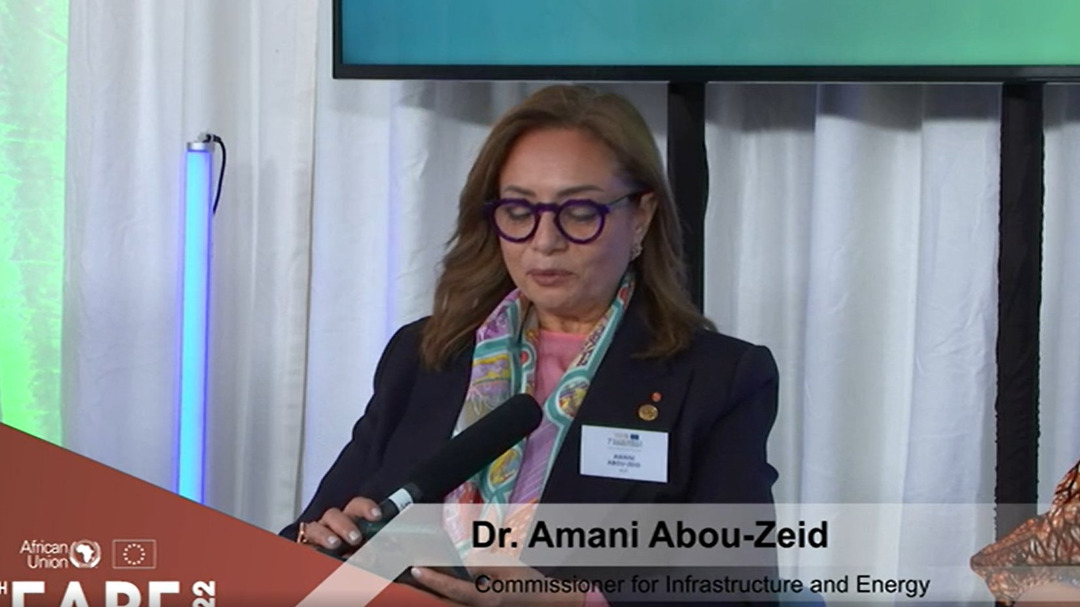|
Getting your Trinity Audio player ready...
|
By Baboloki Semele
The low levels of access to sustainable energy in Africa are having a huge impact on the continent’s industrialisation agenda. The sentiments were shared by African Union’s Commissioner for Infrastructure and Energy Dr Amani Abou-Zeid at the ongoing AU-EU summit in Brussels, Belgium.
Addressing the Sustainable Energy high-level Panel, Dr Aboud-Zeid noted that it is a well-known fact that one of the major pre-requisites for economic and business growth is the provision of sustainable and reliable energy for productive applications, which will be crucial to sustaining economic growth, boosting industrialisation and trade, create jobs and alleviate poverty.
The Commissioner pointed out that for Africa to achieve its transformation and industrialisation objectives, the continent will have to use all its huge and available energy resources to develop and upgrade both grid and off-grid systems at the regional, national and local levels, adding that the African Union Commission is currently focusing on several key strategies to develop the energy sector.
The African continent holds some of the world’s best potential for new renewable energy and green hydrogen production, which could be leveraged to enhance productivity, create jobs and improve lives.
A majority of firms in sub-Saharan Africa lose between 10-30% of their annual sales due to power outages as they have to rely on diesel-powered self-generation systems. The power industry is also characterised by outdated systems and equipment for power generation as well as transmission and distribution. The problem is much more compounded in rural areas, where more than 80% have no access to electricity. This indicates the urgency to implement multiple and complementary strategies to accelerate the provision and expansion of sustainable and reliable modern energy services on the continent.
According to Commissioner Aboud-Zeid, several key strategies to develop the energy sector includes among others regional infrastructure development, since regional integration of energy infrastructure and systems provides several opportunities that include the creation of larger markets for energy services and ensure affordability of energy services; ensure economies-of-scale and profitability for investments in this sector, which will, in turn, attract the private sector and ensure the development of large infrastructure, which will be crucial to promote industrialization and large-scale production on the continent.
Through the African Union Commission led Programme for Infrastructure Development in Africa (PIDA), she says plans are available for implementing 19 large-scale regional energy projects and 9 other projects with a water-energy nexus.
“By 2040, we plan to add 54 GW of hydropower capacity to the regional grids. The successful implementation of the long-term PIDA objectives by 2040 will enable African countries to reduce energy costs and increase access to an additional 800 million people in Africa.” Said Aboud-Zeid
Another key strategy for the African Union Commission is to facilitate and accelerate the uptake of renewable energy systems in our Member States including bioenergy, solar, wind and geothermal energy systems to develop both on-grid and off-grid systems to provide sustainable energy services in both urban and rural areas.
At the moment, African Union Commission is implementing key programmes that focus on renewable energy including the Geothermal Risk Mitigation Facility, the Africa Bioenergy Development Programme, the Solar Energy Development in Africa Programme and the Mini-grids Market Development Programme, which is believed to carry more potential to enhance the policy, regulatory and financial environment to provide sustainable energy services for meeting both basic needs and productive activities in rural and urban areas.
The custodian of energy at the African Union Commission says the continental body is also focusing on promoting energy efficiency and the adoption of smart grids in the power sector. Currently, most sub-Saharan African countries are experiencing between 20 – 40% transmission and distribution losses within their grid systems due to aged and poor-quality infrastructure.
This, according to her, indicates that focusing on energy efficiency and smart distribution systems will provide more energy to both communities and enterprises. The AUC and its continental partners are implementing the programme on Continental Power Master Plan, which aims to develop smart transmission and distribution infrastructure to connect countries and regions across the continent. The AUC also has a dedicated agency, the African Electro Technical Standardization Commission, which focuses on enhancing efficiencies at all levels including generation, transmission and distribution, as well as consumption.
She says the commission is doing all it can to prioritize the mobilisation of adequate financial and technical resources to implement energy projects and programmes. The African energy sector requires about US$120 billion per year of investment to meet the target of Universal Access by 2040. For renewable energy development, about US$36 billion of investments is required per year to meet the targets. However, current spending on renewable energy development in Africa is about US$6 billion and leaving a gap of US$30 billion for renewable energy development. She informed the gathering that African Union Commission is always looking for platforms and opportunities to partner, learn and share experiences with organisations and countries that have a wealth of experience and technical expertise in the global development agenda






